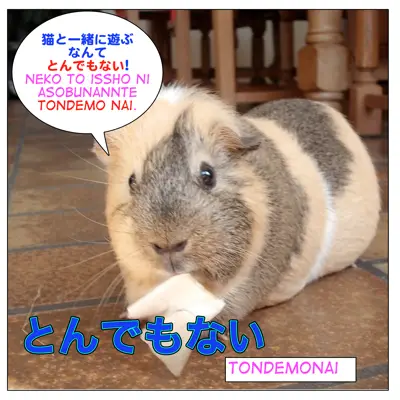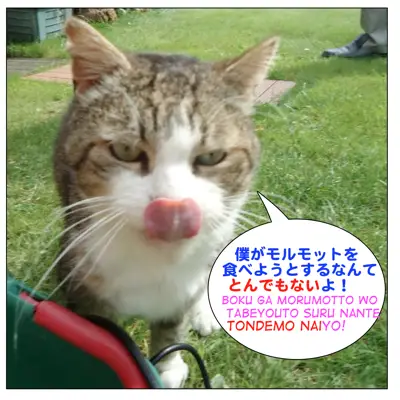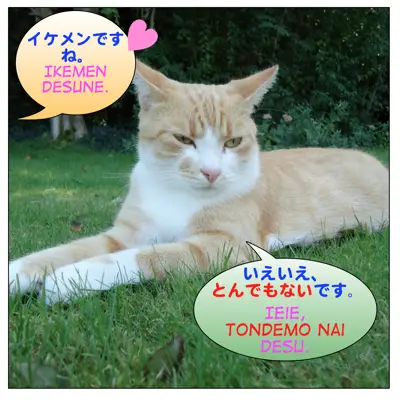
Sumomo:「猫と一緒に遊ぶなんてとんでもない!」
= Neko to issho ni asobu nante tondemo nai!
= There is no way that I would play with cats.

Pilou: 「僕がモルモットを食べようとするなんてとんでもないよ!」
= Boku ga morumotto wo tabeyou to suru nante tondemo naiyo!
= There is no way that I would try to eat a guinea pig.

😍「イケメンですね。」
= Ikemen desu ne.
= You are very handsome!!
Paprika「いえいえ、とんでもないです。」
= Ieie, tondemo nai desu.
= Not at all.
Hi everyone!
Today we have three guest teachers. One lovely guinea pig, Sumomo-Sensei, and her neighbors, Pilou-Sensei and Paprika-Sensei.
I hope they get along well. :)
OK, are we ready?
***********************************
Hello, I am Sumomo. I am a girl guinea pig.
はじめまして!= Hajimemashite = Nice to meet you.
I think I am the first guinea pig teacher to ever teach here.
I will try to include my two neighbor cats, Pilou and Paprika but will put a little distance between us just in case.
So today we will teach you the useful word,
![]() とんでもない (=tondemo nai)
とんでもない (=tondemo nai)
(polite way : とんでもありません (=tondemo arimasen))
🔸 When to use:
1) when you strongly deny the possibility.
Ex. 「スモモ、彼のこと好きなんじゃない?」
= Sumomo kare no koto sukinan janai?
= You are in love with him, aren’t you, Sumomo?
Sumomo: 「とんでもない!」
= Tondemo nai!
= Heavens, no!
Ex. A :「浮気したことある?」
= Uwaki shita koto aru?
= Have you ever cheated on me? (or Have you ever cheated on your partner?)
B : 「とんでもない….」
= Tondemonai…
= No way. (Absolutely not.)
Ex. C: 「もう負けを認めたらどうだ?」(male speech, rough)
= Mou make wo mitometara dou da?
= Why don’t you accept your defeat already?
D: 「とんでもない!勝負はこれからだ!」(male speech, rough)
= Tondemo nai! Shoubu wa korekara da!
= No way! The game has just begun.
Ex. E:「私の日本語は全然うまくなりません。」
= Watashi no nihongo wa zenzen umaku narimasen.
= My Japanese hasn’t improved at all.
Maggie: 「とんでもない!すごく上達してきていますよ。」
= Tondemo nai! Sugoku joutatsu shite kite imasuyo.
= That’s far from true! You have been improving a lot!
2) When you turn down something/refuse someone in a straightforward way.
Ex. F: 「ねえ、今度、デートしない?」
= Nee, kondo deeto shinai?
= Hey, do you wanna go out with me sometime?
G: 「(あんたなんかとデートなんて)とんでもない!」
= (Anta nanka to deeto nante) Tondemo nai.
= There is no way (that I would go out with you.)
Ex. 子供: 「お母さん、友達のうちに遊びに行っていい?」
=Kodomo: Okaasan, tomodachi no uchi ni asobini itte ii?
=A child: “Mom, can I go to my friend’s house to play?”
母:「とんでもない!宿題もしていないのに。」
Haha : = Tondemo nai! Shukudai mo shiteinainoni.
Mother = No way! You haven’t even done your homework yet.
Ex. 夫:「新しい車を買いたいんだけど..」
= Otto: Atarashii kuruma wo kaitain dakedo…
= Husband: I would like to buy a new car…
妻:「とんでもない。今の車のローンがまだ終わっていないのに。」
= Tsuma: “Tondemo nai. Ima no kuruma no roon ga mada owatte inai noni.
= Wife: No way! We haven’t even finished the auto loan for the current car.
3) Giving an extreme example and deny it completely.
⭐️ How to form:
★verb plain form (present tense/past tense) + なんて (=nante) + とんでもない(=tondemo nai)
= There is no way that ~. /It is impossible to ~.
🔸 variation
*とんでもない (=tondemo nai)
↓ (more polite)
*とんでもありません (=tondemo arimasen.)
*とんでもないことだ (=tondemo nai koto da)
:u: (more polite)
*とんでもないことです (=tondemo nai koto desu)
🔸 From the pictures above:
Sumomo「猫と一緒に遊ぶなんてとんでもない!」
= Neko to issho ni asobu nante tondemo nai.
= There is no way that I would play with cats.
Pilou「僕がモルモットを食べようとするなんてとんでもないよ!」
= Boku ga morumotto wo tabeyou to suru nante tondemo naiyo!
= There is no way that I would try to eat a guinea pig.
Ex. 彼が医者だなんてとんでもない。
= Kare ga isha da nante tondemo nai.
= He is anything but a doctor.
Ex.一人で山を登るなんてとんでもない。
= Hitori de yama wo noboru nante tondemo nai.
= There is no way that I would climb a mountain all by myself. / There is no way that I (or we) would allow you to go climb a mountain all by yourself.
Note: We tend to skip the subject so the meaning depends on the situation.
Ex. 私の日本語の先生が犬だなんてとんでもない。
= Watashi no nihongo no sensei ga inu da nante tondemo nai.
= It can’t be true that my Japanese teacher is a dog.
Ex. 彼よりも私の方が日本語がうまいだなんてとんでもない。
= Kare yori mo watashi no hou ga nihongo ga umai da nante tondemo nai.
= There is no way that my Japanese is better than his.
4) When you try to make it sound more humble.
From the picture:
「イケメンですね。」
= Ikemen desu ne.
= You are very handsome!!
Paprika「いえいえ、とんでもないです。」
= Ieie, tondemo nai desu.
= Not at all. (I am anything but handsome)
Ex. A :「 日本語がお上手ですね。」
= Nihongo ga ojouzu desune.
= Your Japanese is very good! (You speak Japanese very well)
B: 「とんでもない。まだまだです。」(being humble/modest)
= Tondemo nai. Madamada desu.
= Not at all! There is still a long way to go.
Ex. 「息子さん優秀だから鼻が高い*ですね。」
= Musuko san yuushuu kara hana ga takai desune.
= You must be very proud of your bright son.
Note: 鼻が高い (=hana ga takai) is an expression, to be proud of oneself/someone close to you.
「とんでもないです。お宅の息子さんに比べたら全然だめです。」
= Tondemo nai desu. Otaku no musko san ni kurabetara zenzen dame desu.
= No way. Compared to your son, my son is nothing.
Cultural note:
Though it sounds strange, this type of conversation is common in Japanese society. If you want to learn more, go check my “謙遜(=kenson) lesson.
(How to be humble in Japanese)
Ex. 私がマギー先生の代わりをするなんてとんでもないことです。
= Watashi ga Maggie Sensei no kawari wo suru nante tondemo nai koto desu.
= There is no way that I could replace Maggie Sensei.
5) You say とんでもない (=tondemonai) instead of saying,
![]() どういたしまして= douitashimashite= You’re welcome. Don’t mention it./ Not at all./It was nothing.
どういたしまして= douitashimashite= You’re welcome. Don’t mention it./ Not at all./It was nothing.
Ex. A: 「スモモ先生、ゲスト先生になってくれてありがとうございます。」
= Sumomo sensei, gesuto sensei ni natte kurete arigatou gozaimasu.
= Thank you for being a guest teacher, Sumomo Sensei.
Sumomo: 「とんでもない。楽しかったです。」
= Tondemo nai. Tanoshikatta desu.
= Please don’t mention it. It was fun.
Ex. A: 「本当にありがとうございました。」
= Hontou ni arigatou gozaimashita.
= Thank you very much.
B: 「いえいえ、とんでもないです。」
= Ieie tondemo nai desu.
= Don’t mention it.
Note: It sounds a bit exaggerated (or dramatic).
As I mentioned above, the polite way to say とんでもない(=tondemo nai ) is
![]() とんでもありません(=Tondemo arimasen.)
とんでもありません(=Tondemo arimasen.)
![]() とんでもないことです (= Tondemo nai koto desu.)
とんでもないことです (= Tondemo nai koto desu.)
![]() Very formal: とんでもないことでございます(=Tondemo nai koto de gozaimasu.)
Very formal: とんでもないことでございます(=Tondemo nai koto de gozaimasu.)
Though it is considered to be wrong many people do say:
![]() とんでもございません (= Tondemo gozaimasen.) in business or formal situations.
とんでもございません (= Tondemo gozaimasen.) in business or formal situations.
It is getting more and more acceptable in daily conversation.
6) When you tell someone that you are not able to let them do something because they are too good.
Ex. A: 「それでは家まで送りましょうか?」
= Soredewa ie made okukrimashouka?
= OK, then would you like me to give you a ride?
B : 「とんでもないです。バスで帰ります。」
= Tondemo nai desu. Basu de kaerimasu.
= Oh no.. (Please don’t bother /There is no way that I will let you do that). I will go home by bus.
Ex. A: (レストランで)「ここは私が払います。」
= (Resutoran de) ” Koko wa watashi ga haraimasu.”
= At a restaurant “Let me take care of this./ Let me pay here.”
B : 「とんでもありません。この間も御馳走になったのに。」
= Tondemo arimasen. Kono aida mo gochisou ni natta noni.
= There is no way. You treated me/us last time so…
7) When you emphasize nouns or adjectives which come after とんでもない(=tondemonai).
★とんでもない (=tonndemonai) + noun
![]() extraordinary~ , crazy, ridiculous, outrageous, tremendous, absurd, terrible
extraordinary~ , crazy, ridiculous, outrageous, tremendous, absurd, terrible
Ex. とんでもないことになるよ。(casual)
= Tondemo nai koto ni naru yo.
= You will be in a big trouble. / It will turn out to be something horrible./ Something horrible will happen.
Ex. それはとんでもない話だ。
= Sore wa tondemo nai hanashi da.
= That’s ridiculous!
Note: It could be negative or positive.
:u:
(negative)
Ex. あいつはとんでもないやつだ。(やつ = yatsu = derogatory)
= Aitsu wa tondemo nai yatsu da.
= He is such a terrible guy.
(positive)
Ex. 彼はとんでもない美人と付き合っているらしい。
= Kare wa tondemo nai bijinn to tsukiatte iru rashii.
= I heard he is dating a stunning beauty.
(could be both)
Ex. 今年はとんでもない新人が会社に入ってきた。
= Kotoshi wa tondemo nai shinjin ga kaisha ni haitte kita.
= An incredible freshman joined our company this year.
(This freshman could be incredibly good or bad.)
Ex. とんでもないご迷惑をおかけして大変申し訳ございません。
= Tondemo nai gomeiwaku wo okakeshite taihen moushiwake gozaimasen.
= I’m sorry I caused you so much trouble.
Ex. それはとんでもない嘘です。
= Sore wa tondemo nai uso desu.
= That’s an outrageous lie.
Ex. とんでもない値段をふっかけてきた。
= Tondemo nai nedan wo fukkakete kita.
= They charged me an outrageous price.
★とんでもなく(=tondemonaku) + adj = tremendously, very (conversational)
Ex. 今年の夏はとんでもなく暑い。
= Kotoshi no natsu wa tondemo naku atsui.
= It is extremely hot this summer.
Ex. この物件はとんでもなく安い。
= Kono bukken wa tondemo naku yasui.
= This piece of real estate is incredibly cheap.
Ex. とんでもなく大きなヘマをしてしまった。
= Tondemo naku ookina hema wo shite shimatta.
= I made a terrible mistake.
Ex. 私は歌がとんでもなく下手です。
= Watashi wa uta ga tondemo naku heta desu.
= I am REALLY bad at singing.
 マギー先生より = Maggie Sensei yori = From Maggie Sensei
マギー先生より = Maggie Sensei yori = From Maggie Sensei
スモモ先生、ピロウ先生、パプリカ先生ありがとう!
= Sumomo Sensei, Pilou Sensei, Paprika Sensei arigatou!
= Thank you, Sumomo-Sensei, Pilou-Sensei and Paprika Sensei!
私が猫やネズミを追いかけていたなんてとんでもない噂を信じないでね。 :)
= Watashi ga neko ya nezumi wo oikakete ita nante tondemo nai uwasa wo shinjinai dene.
= Please do not believe that ridiculous rumor that I used to chase cats or mice. (It is far from the truth.)
***
Will you be my Patron?
I appreciate your support! サポートありがとう!

8 Comments
分かりやすく説明してくれました!参考にさせていただきます!
お役に立てたらうれしいです。☺️
Hello !JYANE! Amazing lesson Sensei. I love the word. I have a little question:
“Kare yori mo watashi no hou ga nihongo ga umai da nante tondemo nai.”
How many “ga” can I use in the same sentence? I guess it’s because “hou ga” is always using ga but, it sounds a little new to me, I don’t know if it’s fine but I would have say something like “watashi niwa” or “watashi no hou niwa” (I don’t know if hou niwa even exists !gejigeji! )
Can I say something like “watashi ga uta ga heta desu” oooor do I have to say “watashi (ni)wa”? I’ve seen wa, ni, niwa, but I don’t recall having seen ga with that kind of potential/adjective words !ase!
Thank you in advance sensei boucingheart!
@Rhi
Hello Rhi!
彼よりも私の方が日本語がうまいだなんてとんでもない。
“Kare yori mo watashi no hou ga nihongo ga umai da nante tondemo nai.”
Yes, there are two が in the sentence.
Since you need to use が in the following sentences,
1) Aより(も)Bの方が〜 As you said, it is a pattern using が(=ga) here. (You can’t replace this が with には(niwa))
2) 日本語がうまい (=nihongo ga umai)
When you want to emphasize Japanese, you use が(=ga)
If you say 日本語は上手い(=Nihongo wa umai) it shows the contrast so you imply “to be good at Japanese but maybe bad at other languages”. )
Therefore you need two が.
1)
********
“watashi ga uta ga heta desu”
→Usually we say 私は歌が下手です。= Watashi wa uta ga heta desu.
You only use が(=ga) after 私(=watashi) when you try to focus on the subject.
For example, you are telling someone 歌が下手です= Uta ga heta desu = bad at singing.
They will ask you “who doesn’t sing well?” 誰が歌が下手なんですか?= Dare ga uta ga heta nan desu ka?
You can say “私が歌が下手です。= Watashi ga uta ga heta desu. = I am the one who can’t sing well.
It is possible to have more than one が in one sentence if it is necessary.
But we sometimes change the sentence in order to avoid using the same particles.
Ryoukai! !JYANE! I’m finally starting to distinguish the particle difference, but it’s a slow process lol At first I was dealing with the niwa but it finally sounds different to my ears, using the one or the other.
I get that “ga” is used when you want to emphasize the subject, as when asking a question, even if there’s another subject, “uta” in this case, which is unskilled, hence de “uta GA heta”, but since it’s me the subject I’m emphasizing when I answer that question of “dare ga…”, I use it for me too. I don’t think that asking “dare ni wa uta ga heta desu ka?”, would ever sound right to me to ask that, it sounds more like asking for an opinion. It’s very tricky, the japanese grammar
Kedo, Maggie Sensei no okage de yatto wakatte kuru boucingheart! Arigatou gozaimashita :3
@Rhi
どういたしまして、Rhi!
It’s true. The difference between “ga” and “wa” is very tricky. But eventually you will know what sounds more natural.
You use には=niwa
1) for ~ Ex. It is difficult for me. = 私には難しいです。=Watashi niwa muzukashii desu.
2) in (location) Ex. There are many tourists in Kyoto. = 京都には観光客が一杯います。= Kyouto niwa kankoukyaku ga ippai imasu.
がんばってね! :)
このレッスンはとんでもなく分かりやすいと思う。とんでもないという言葉は日常的に使えそうだ。
@エドワード
は〜い、よく使う言葉なので是非、使ってみてくださいね!